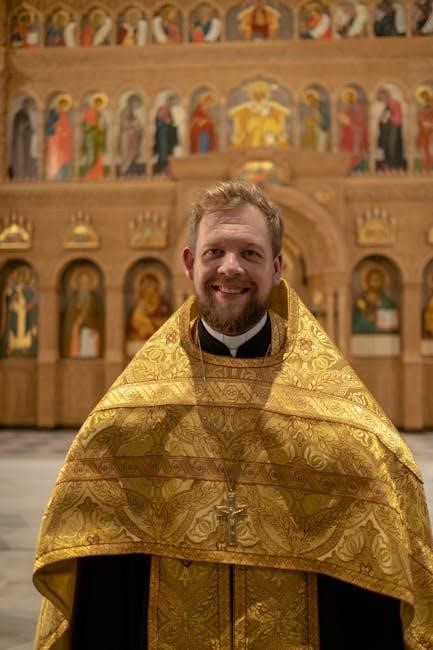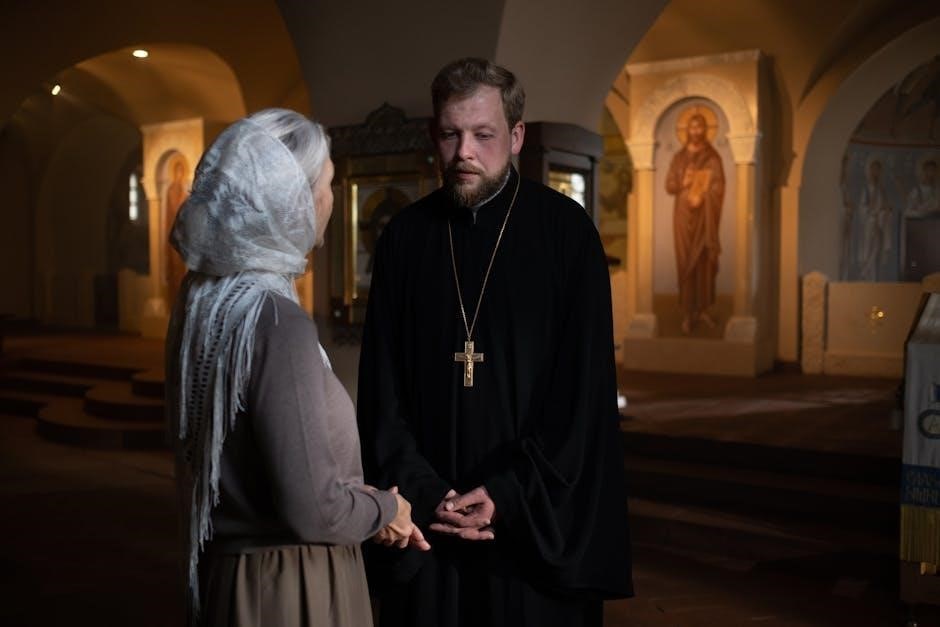Orthodox Confession is a sacred sacrament of repentance‚ offering believers a path to spiritual healing through prayerful self-examination and sincere acknowledgment of sins before God and a priest.
1.1 What is Orthodox Confession?
Orthodox Confession is a sacred mystery of the Church‚ a voluntary act of faith where believers openly acknowledge their sins before God and a priest‚ seeking forgiveness and spiritual healing. It is rooted in biblical teachings‚ such as Proverbs 28:13‚ which emphasizes the importance of confessing sins for salvation. The priest acts as a spiritual guide‚ offering guidance and prayer‚ while the penitent humbly reveals their transgressions. This sacrament is a profound expression of repentance‚ enabling the faithful to draw closer to God and embark on a path of spiritual renewal and reconciliation.
1.2 The Significance of Confession in Orthodox Christianity
Confession holds profound significance in Orthodox Christianity as a sacrament of healing and reconciliation. It restores the believer’s relationship with God and the Church‚ fostering spiritual growth and humility. By openly acknowledging sins‚ individuals seek forgiveness‚ cleansing their conscience and drawing closer to divine grace. This sacred act emphasizes accountability‚ repentance‚ and the transformative power of God’s mercy. Through confession‚ believers are renewed in spirit‚ strengthened in faith‚ and guided toward a life aligned with Christ’s teachings‚ ultimately preparing them for Holy Communion and eternal salvation.

Preparation for Holy Confession
Preparation involves prayerful self-reflection‚ examining thoughts‚ words‚ and actions‚ and seeking spiritual guidance to honestly acknowledge sins before God and the priest.
2.1 Prayerful Examination of Conscience
A prayerful examination of conscience is a vital step in preparing for Holy Confession. It involves reflecting on one’s thoughts‚ words‚ and actions‚ seeking to identify sins and weaknesses. This process should be done humbly and sincerely‚ asking for God’s guidance and mercy. One should consider their relationship with God and others‚ examining areas such as faith‚ love‚ and obedience. The goal is to approach Confession with a contrite heart‚ ready to acknowledge sins and seek forgiveness. Regular prayer and self-reflection help deepen this practice.
2.2 The Role of Prayer Before Confession
Prayer is a cornerstone of preparation for Holy Confession. It helps the believer humble themselves‚ seek God’s mercy‚ and open their heart to repentance. Reciting prayers such as Psalm 50/51‚ which expresses deep contrition‚ is a common practice. Additionally‚ reading introductory prayers from the Order of the Holy Mystery of Repentance can guide the soul toward sincerity. Prayer softens the heart‚ enabling the individual to approach Confession with honesty and readiness to embrace God’s forgiveness. Through prayer‚ one invites the Holy Spirit to illuminate their conscience and prepare them for a meaningful confession.
2.3 Writing Down Sins for Clarity
Writing down sins before confession fosters clarity and honesty‚ ensuring no transgressions are overlooked. This practice helps organize thoughts‚ preventing forgetfulness during the sacrament. By reflecting on specific actions‚ words‚ and omissions‚ individuals can present their sins with precision; It also encourages accountability and sincerity‚ fostering a deeper repentance. This method‚ recommended by spiritual guides‚ aids in making confession thorough and meaningful‚ allowing the believer to approach the sacrament with a prepared and contrite heart‚ ready to seek God’s forgiveness and healing.
2.4 Seeking Guidance from Spiritual Fathers
Seeking guidance from spiritual fathers is crucial for a meaningful confession. These experienced guides offer wisdom and help identify sins‚ fostering a deeper understanding of one’s spiritual state. They provide counsel based on Orthodox teachings and personal experience‚ ensuring the penitent approaches confession with sincerity. Spiritual fathers act as intermediaries between the believer and God‚ helping to clarify doubts and offering prayers for healing. Their role emphasizes the importance of humility and trust‚ encouraging believers to open their hearts fully. This guidance enriches the confession experience‚ leading to genuine repentance and spiritual growth.

The Sacrament of Confession
Orthodox Confession is a sacred ritual where believers openly acknowledge their sins to God through a priest‚ seeking forgiveness and spiritual renewal in Christ.
3.1 The Order of the Holy Mystery of Repentance
The sacrament begins with introductory prayers led by the priest‚ acknowledging human frailty and the need for divine mercy. The penitent recites Psalm 50‚ expressing repentance. They then confess their sins openly‚ without omission. The priest offers guidance and imposes a penance if needed. The absolution prayer follows‚ invoking God’s forgiveness. The rite concludes with prayers of thanksgiving and restoration‚ reaffirming the believer’s communion with God and the Church.
3.2 The Priest’s Role in Confession
The priest serves as a spiritual physician‚ guiding the penitent through the sacrament with compassion and wisdom. He leads the introductory prayers‚ offers counsel‚ and imposes penance when necessary. The priest pronounces the absolution prayer‚ conveying God’s forgiveness. He maintains the seal of confession‚ ensuring confidentiality. The priest’s role is to assist the believer in understanding their sins and embracing repentance‚ fostering spiritual growth and reconciliation with God.
3.4 The Absolution Prayer and Its Meaning
The Absolution Prayer is the climax of Orthodox Confession‚ where the priest‚ by God’s authority‚ declares forgiveness of sins. This prayer is a divine gift‚ restoring the believer’s union with God. It embodies the Church’s power to bind and loose‚ as granted by Christ. The prayer is a declaration of God’s mercy and grace‚ offering spiritual renewal and reconciliation. It is a source of comfort and strength‚ enabling the penitent to live a life transformed by God’s love and forgiveness.

The Importance of Regular Confession
Regular confession fosters spiritual growth‚ cleanses the soul‚ and strengthens the believer’s relationship with God. It prepares one for Holy Communion and nurtures a life of repentance.
4.1 Confession and Holy Communion
Confession is deeply intertwined with Holy Communion‚ as it purifies the soul to receive the Eucharist worthily. Through confession‚ believers acknowledge their sins‚ seek forgiveness‚ and renew their spiritual state‚ preparing them to partake in the sacred mystery of Holy Communion. Regular confession ensures that one approaches the altar with a clean heart‚ fostering a deeper union with Christ and the Church. This sacramental relationship highlights the Orthodox understanding of communal worship and personal spiritual accountability.
4.2 The Frequency of Confession in Orthodox Practice
In Orthodox Christianity‚ the frequency of confession varies depending on individual spiritual needs and parish practices. Many faithful confess at least once a month‚ especially before receiving Holy Communion. For those receiving Communion more than once a month‚ regular confession is strongly encouraged. The Church advises confessing as often as needed to maintain spiritual health‚ with some believers choosing to confess weekly or during major fasting periods. Ultimately‚ the frequency is guided by personal conscience and the counsel of a spiritual father‚ ensuring a consistent journey toward repentance and growth in holiness.

Overcoming Fear and Embarrassment
Overcoming fear and embarrassment in confession requires trust in the priest as a spiritual healer and humility. Understanding the seal of confession assures confidentiality‚ fostering sincerity and peace.
5.1 Understanding the Seal of Confession
The seal of confession is a sacred and inviolable confidentiality between the penitent and God‚ safeguarded by the priest. It ensures that no confession can ever be disclosed‚ even legally‚ emphasizing trust and sincerity. This divine bond allows believers to openly share their sins without fear of exposure‚ fostering genuine repentance and spiritual healing. The priest acts as a mediator of God’s mercy‚ not a judge‚ reinforcing the confidentiality essential for a heartfelt confession.
5.2 The Priest as a Spiritual Physician
The priest in Orthodox Confession serves as a spiritual physician‚ guiding believers to diagnose and treat their soul’s ailments through repentance. Like a doctor‚ he offers healing through prayer‚ advice‚ and absolution‚ enabling the faithful to overcome sin and grow spiritually. His role is non-judgmental‚ focused on restoring health to the soul‚ ensuring confidentiality and compassion. This paternal care fosters an environment of trust‚ allowing penitents to confront their weaknesses openly and embrace a path of renewal and humility. Through his ministry‚ the priest embodies Christ’s healing presence in the sacrament.

The Benefits of Confession
Confession purifies the soul‚ restores communion with God‚ and heals emotional and spiritual wounds. It fosters humility‚ promotes inner peace‚ and strengthens faith‚ drawing believers closer to divine grace.
6.1 Spiritual Healing and Renewal
Confession brings profound spiritual healing by reconciling believers with God and themselves. Through sincere repentance‚ individuals experience renewal‚ as their hearts are cleansed from guilt and shame. This sacrament restores peace of mind and strengthens the soul‚ enabling a deeper connection with God. The absolution received during confession releases the penitent from spiritual bondage‚ allowing them to embrace a life transformed by grace and humility. Ultimately‚ confession becomes a powerful tool for spiritual growth and eternal salvation.
6.2 Growing in Humility and Repentance
Confession cultivates humility as believers acknowledge their sins openly‚ surrendering pride and self-justification. This sacred act fosters a deeper understanding of one’s weaknesses and the need for divine mercy. Through genuine repentance‚ individuals grow in humility‚ recognizing their dependence on God’s grace. The process of confession encourages a lifelong commitment to spiritual growth‚ as believers continually seek to refine their hearts and minds. By embracing repentance‚ one nurtures a humble spirit‚ essential for drawing closer to God and living a life of virtue and compassion.

Guidance for Specific Life Situations
Orthodox confession offers tailored guidance for various life circumstances‚ including confession for children and life confession for profound repentance‚ ensuring spiritual support for all stages and challenges.
7.1 Confession for Children
Confession for children is adapted to their age and understanding‚ emphasizing repentance and God’s loving forgiveness. Parents and priests guide them in simple‚ honest acknowledgment of sins‚ fostering humility and spiritual growth. The sacrament is presented as a healing encounter with Christ‚ encouraging children to develop a lifelong practice of repentance and reconciliation. Regular participation helps them cultivate a conscience attuned to God’s love and mercy‚ providing a foundation for lifelong spiritual renewal and closeness to God.
7.2 Life Confession: Preparing for a Deep Repentance
Life confession is a profound sacramental practice where one confesses all sins from their lifetime‚ seeking deep spiritual renewal. Preparation involves prayerful self-examination‚ often with written notes‚ to ensure honesty. The sacrament typically lasts 45-60 minutes‚ allowing for thorough repentance. Guidance from a spiritual father is crucial‚ offering personalized advice and absolution. This intense encounter with God’s mercy fosters profound healing and a renewed commitment to a Christ-centered life‚ emphasizing the transformative power of genuine repentance and divine forgiveness.

The Wisdom of the Church Fathers
The Church Fathers‚ like St. John Chrysostom and St. Nicodemus‚ offer timeless wisdom on confession‚ emphasizing humility‚ sincerity‚ and the transformative power of repentance in drawing closer to God.
8.1 Teachings of St. John Chrysostom on Confession
St. John Chrysostom emphasizes the importance of detailed confession‚ urging believers to confess each sin specifically rather than vaguely. He teaches that true repentance requires acknowledging the depth of one’s transgressions and seeking forgiveness with humility. Chrysostom’s sermons highlight confession as a means of spiritual healing‚ stressing the need for sincerity and a contrite heart. His teachings underscore the transformative power of confession‚ aligning it with the Orthodox tradition of repentance and renewal through Christ.
8.2 The Guide to Confession by St. Nicodemus
St. Nicodemus’ guide to confession provides a comprehensive approach to repentance‚ emphasizing prayerful preparation and self-examination. He advises believers to reflect on their thoughts‚ actions‚ and attitudes‚ ensuring a thorough confession. Nicodemus stresses the importance of listing sins for clarity and seeking guidance from spiritual fathers. His teachings encourage humility and openness‚ viewing the priest as a spiritual physician. The guide also highlights the necessity of frequent confession for spiritual growth and the proper reception of Holy Communion‚ aligning with Orthodox tradition and fostering a deeper connection with God through sincere repentance and forgiveness.

Common Questions About Confession
How long should confession take? Most people spend 45–60 minutes‚ but it varies. Forgetting sins during confession is common; simply mention them later. Seek guidance humbly.
9.1 How Long Should a Confession Take?
The duration of confession varies‚ with most people spending 45–60 minutes for a life confession. Some may complete it in 30 minutes‚ while others need more time. Factors like the number of sins‚ depth of reflection‚ and personal comfort influence the length. It’s important to be thorough and sincere‚ ensuring all significant sins are addressed. Rushing through confession is discouraged‚ as it is a sacred opportunity for spiritual healing. The priest will guide the process‚ helping to ensure completeness without unnecessary prolongation. The focus should be on heartfelt repentance rather than adhering to a strict time frame.
9.2 What If I Forget Some Sins During Confession?
Forgetting sins during confession is a common experience. If this happens‚ it is important to mention the forgotten sins in your next confession. Orthodox teachings emphasize sincerity and completeness‚ but they also acknowledge human frailty. If you later recall unconfessed sins‚ bring them up in your subsequent confession without undue distress. The priest may offer guidance on how to handle such situations‚ ensuring your repentance remains genuine and effective. The key is to approach confession with humility and a willingness to grow spiritually‚ trusting in God’s mercy and forgiveness. This practice fosters ongoing healing and renewal.
Orthodox Confession is a transformative sacrament‚ offering healing‚ renewal‚ and a deeper connection with God. Regular participation fosters spiritual growth‚ humility‚ and a life rooted in repentance and grace.
10.1 The Path to Spiritual Growth Through Confession
Orthodox Confession is a vital sacrament for spiritual growth‚ enabling believers to confront sin‚ seek forgiveness‚ and embrace a life of repentance. Through prayerful self-examination and honest disclosure of sins‚ individuals deepen their humility and draw closer to God. Regular confession fosters a mindset of continuous renewal‚ allowing Christians to overcome spiritual weaknesses and live according to Christ’s teachings. The priest‚ as a spiritual guide‚ offers wisdom and encouragement‚ helping believers navigate the path to healing and a more harmonious relationship with God and others.

Recommended Resources
Explore books like “If We Confess Our Sins” and guides from the Orthodox Church in America for practical advice on confession and spiritual growth.
11.1 Books on Orthodox Confession
Deepen your understanding of Orthodox Confession with books like “If We Confess Our Sins” by the Orthodox Church in America‚ offering practical guidance for repentance. Another essential read is “A Guide to Confession” by St. Nicodemus‚ providing detailed insights into the sacrament. These resources offer comprehensive examinations of the doctrine‚ preparation‚ and spiritual benefits of confession‚ helping believers navigate the path to forgiveness and renewal; They are invaluable tools for those seeking to enrich their faith and deepen their relationship with God.
11.2 Online Guides and Articles
Explore online resources like “A Practical Guide to Confession” and articles from the Orthodox Church in America‚ offering insights into preparing for confession. Websites such as OrthodoxWiki provide detailed explanations of the sacrament‚ while blogs like “Orthodox Christian Parenting” share practical advice for families. These online guides are accessible and concise‚ helping believers understand the significance of confession and how to approach it with sincerity. They complement traditional texts‚ making spiritual guidance available to everyone in the digital age.
